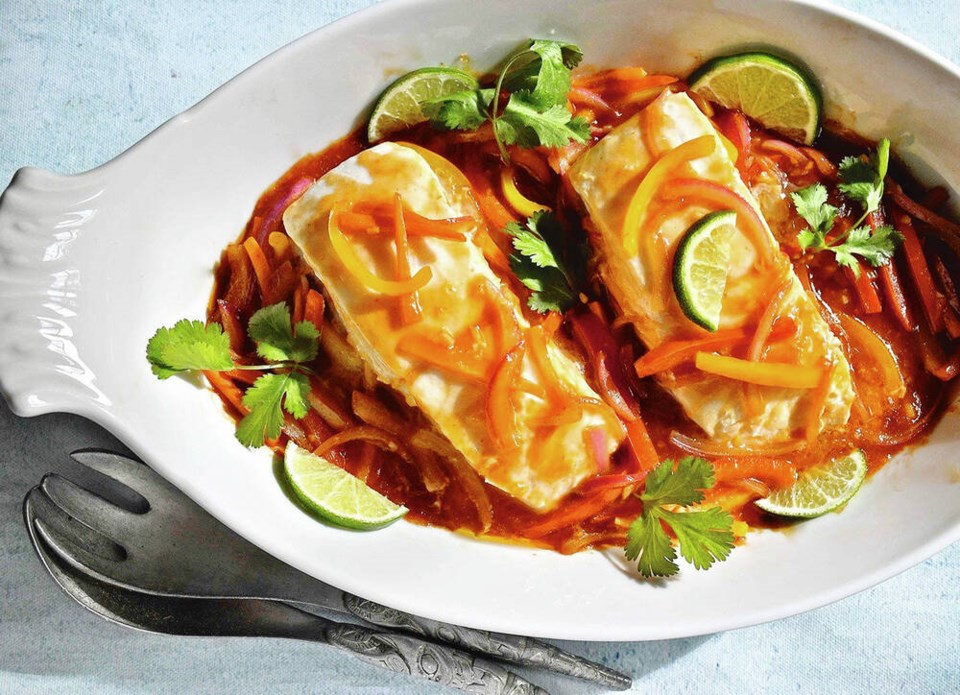When people move to a new part of the world, they bring a taste for the foods they enjoyed in their former homes. That explains how a dish called escabeche became popular in many countries, including Spain.
Lore suggests that millennia ago, Middle Eastern and North African settlers introduced it to that country. In medieval times, it was known as sikbaj, a Persian word meaning vinegar stew or vinegar food, and made with such things as lamb, spices and vinegar, which was used as a food preservative before refrigeration was available.
Over time, the word sikbaj became the Spanish escabeche in Spain. And fish eventually became the preferred ingredient in the dish, which also became popular in the Provence region of France and other parts of southern Europe.
Over the centuries, it also turned up in the far-flung places where the Spanish ventured, such as the Philippines, Guam, Peru, Mexico and other locales. You also find a version of escabeche made in Jamaica called escovitch.
In each place, variations on how escabeche was made developed, depending on the ingredients that were available and taste preferences.
When you research recipes for escabeche, they can vary greatly, depending on the country they originate from.
But most consist of fish, whether whole or pieces, that’s marinated, cooked and/or pickled in a highly flavoured acidic, vinegar-spiked mixture, often with vegetables, and served hot or cold.
Some recipes use citrus juice as the acidic ingredient. There are also still recipes for escabeche using meat, others that use chicken, and some that only use vegetables.
My recipe for escabeche is Filipino/Asian in style, and includes ingredients such as soy sauce and ginger. It’s essentially fish that’s cooked and topped with a saucy, vinegar-spiked, sweet and sour, vegetable-rich sauce.
Rather than fry the fish, as they might do in the Philippines, I baked it. And to give it a B.C. twist, I used first-of-the-season halibut fillets.
Escabeche-style Baked Halibut
Fresh B.C. halibut is baked and topped escabeche-style, with a saucy, sweet and sour, vinegar-spiked vegetable mixture. Serve the fish with steamed rice and steamed green vegetable.
Preparation time: 30 minutes
Cooking time: 12 to 13 minutes
Makes: two servings
1/4 cup + 1 Tbsp orange juice or unsweetened pineapple juice
1 Tbsp lime juice
1 Tbsp rice vinegar
1 Tbsp + 1 tsp brown sugar
1 Tbsp ketchup
2 Tbsp water
1 tsp soy sauce
1/2 tsp Sriracha or other hot chili sauce, or to taste
1 tsp finely chopped fresh ginger
1 large garlic clove, minced
1 Tbsp + 1 tsp vegetable oil (divided)
2 (5-to 6-ounce/140- to 170 grams) halibut fillets
• salt and ground white pepper, to taste
1/4 cup red bell pepper, cut into thin strips
1/4 cup yellow bell pepper, cut into thin strips
1/4 cup red or white onion, cut into thin strips
1/4 cup carrot, cut into thin strips
1 tsp cornstarch
• lime slices and small cilantro sprigs or sliced green onion, to taste, for garnish
Combine the orange juice (or pineapple juice), lime juice, vinegar, sugar, ketchup, water, soy sauce, Sriracha, ginger and garlic in a small bowl, and set aside.
Preheat oven to 400 F. Brush the bottom of a 10-inch long oval or similar-sized baking dish with 1 tsp of the oil. Set the halibut in the baking dish in a single layer and season with salt and pepper. Put the halibut in the oven and bake 8 minutes.
While the fish bakes, pour the 1 Tbsp of vegetable oil in a 9-inch skillet set over medium-high heat. When oil is hot, add the bell peppers, onion and carrot and cook until just softened, about two minutes. Mix the cornstarch into the juice mixture in the bowl. Pour into the skillet, bring to a simmer, and simmer 30 seconds. Remove skillet from the heat.
When halibut has baked eight minutes, spoon the saucy sweet-and-sour vegetables in the skillet on and beside the fish. Set halibut back in the oven and bake four to five minutes more, or until cooked through. Garnish the halibut with lime slices and cilantro sprigs (or sliced green onion), and serve.
Eric Akis is the author of eight cookbooks. His columns appear in the Life section Wednesday and Sunday.



